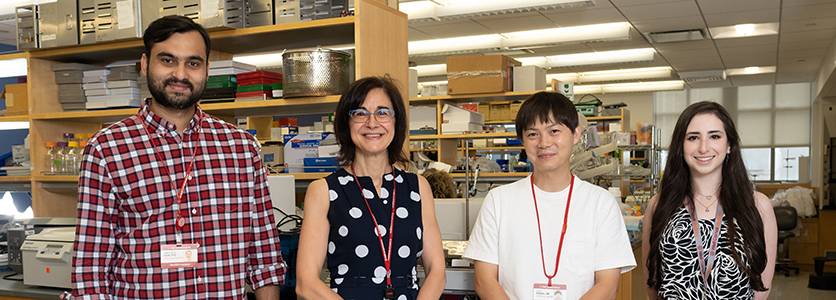Contact Information
Teresa Sanchez, PhD
Associate Professor of Pathology and Laboratory Medicine, Vascular Biology
Associate Professor of Neuroscience, Feil Family Brain and Mind Research Institute
Weill Cornell Medicine
Endothelial dysfunction plays a critical role in organ failure and death in numerous clinical settings. In cerebrovascular diseases and central nervous system pathologies, blood brain barrier dysfunction contributes to the exacerbation of neuronal injury; during sepsis and systemic inflammatory response syndrome, vascular leakage and disseminated intravascular coagulation leads to tissue hypoxia, multiple organ dysfunction and death. Although the therapeutic potential of the endothelium to treat these conditions is beginning to be appreciated, the limited understanding of the endothelial-specific molecular mechanisms governing microvascular dysfunction is a critical barrier blocking the progress towards developing novel endothelial-targeted therapies for these highly unmet clinical needs. Compared to other therapeutic approaches, aimed at broadly suppressing the inflammatory response, the therapeutic targeting of the endothelium has the potential to mitigate organ dysfunction and improve clinical outcomes without compromising the immune response, which is pivotal not only in patients suffering from critical illnesses, but also chronic diseases.
Our laboratory investigates the molecular and cellular mechanisms governing microvascular dysfunction in various pathological conditions, such as sepsis and cerebrovascular diseases. Our long-term goal is to identify endothelial-enriched targetable pathways to treat these conditions and their chronic sequelae. Towards this goal we have established and validated i) clinically relevant animal models of cerebrovascular diseases and sepsis, ii) global and tissue-specific inducible genetically engineered mice, iii) assays to assess vascular and neuronal function, iv) novel methods to determine the molecular alterations in cerebral microvessels in disease models and v) immunodetection protocols in human tissues to investigate the pathophysiological relevance in humans of our animal findings.
By using this multidisciplinary approach, our laboratory has identified the critical role of the sphingolipid signaling pathway in vascular homeostasis. Sphingosine-1-phosphate, a bioactive sphingolipid very abundant in plasma and produced by endothelial cells, signals via interaction with its G protein coupled receptors, S1PR. We found that the sphingosine-1-phosphate receptors, S1PR1 and S1PR2, potently and differentially regulate endothelial function and endothelial responses to injury. While S1PR2 induces vascular leakage and endothelial inflammation during sepsis (Zhang et. al, Blood, 2013) and stroke (Kim et al., Nature Communications 2015), S1PR1 is an endogenous protective signaling pathway in the endothelium which maintains blood brain barrier function and limits brain injury after stroke (Yanagida et al. PNAS 2017, Nitzsche et al. Circulation Research 2020). Interestingly, we also found that S1PR2 is primarily detected in the endothelium in the human brain (Kim et al. Nature Communications 2015). Noteworthy, S1PR2 mRNA is induced both in mouse cerebral microvessels after ischemia, hypoxia and inflammation and in human stroke lesions (Lee et al. Nature Protocols, 2019). Mechanistically, we and others have shown that S1P via S1PR1 promotes endothelial barrier integrity in a Gi-phosphatidylinositol-3-kinase (PI3K)-Akt dependent way. In sharp contrast, pioneering work from our lab showed that S1PR2 potently activates the Rho-Rho-associated kinase (ROCK) pathway in the endothelium, which counteracts the PI3K-Akt pathway and induces profound changes in the endothelial cytoskeleton (i.e. stress fiber formation and cell contraction leading to the disassembly of junctions) and the expression of pro-inflammatory and pro-coagulant genes via nuclear factor kappa B (NF-kB) activation (reviewed in Sanchez, Current Atherosclerosis Reports, 2016). Thus, upregulation of S1PR2 is a key molecular switch, shifting S1P signaling from vasoprotective and anti-inflammatory to pro-inflammatory.
Current efforts in our laboratory are aimed at investigating the molecular mechanisms governing sphingolipid signaling in microvessels, devising novel strategies to target the sphingolipid pathway in vascular cells and the discovery of endothelial-enriched, translationally relevant, targetable pathways governing cerebral microvascular dysfunction in various pathological conditions.
R01-NS114561
NIH/NINDS
Role: Principal Investigator
R01-AG49952
NIH/NIA
Role: Principal investigator subaward (Schaffer, Cornell Ithaca)
Daedalus-Milstein Fund for Innovation
Weill Cornell Medicine-Tri-Institutional Therapeutics Discovery Institute
Role: Principal Investigator
R21-NS104512
NIH/NINDS
Role: Co-Investigator
PI: Teresa Sanchez Garcia-Vao, PhD
National Institutes of Health (R01 supplement grant)

Teresa Sanchez, PhD
Associate Professor of Pathology and Laboratory Medicine, Vascular Biology
Associate Professor of Neuroscience, Feil Family Brain and Mind Research Institute
Weill Cornell Medicine